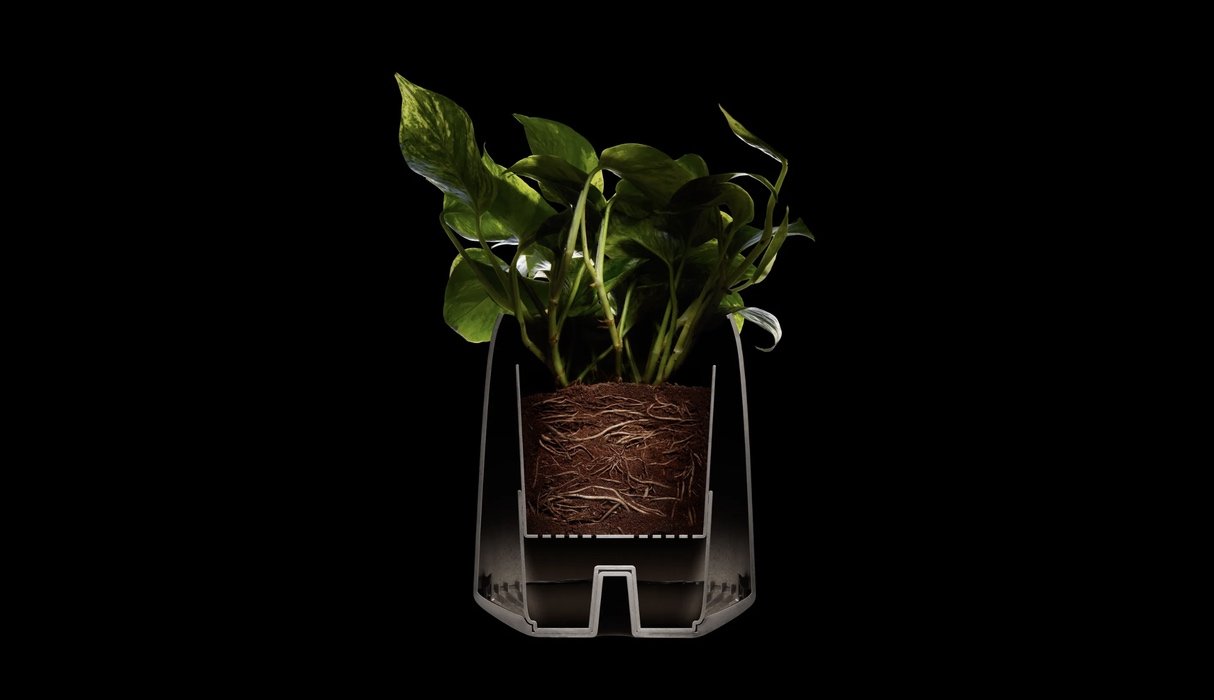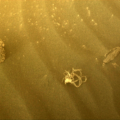Bioengineering R&D company Neoplants says its ‘directed evolution’ houseplants can clean the air inside your home 30 times more efficiently than an ordinary houseplant. This is due to genetically engineered bacteria that convert some of the most common and dangerous indoor air pollutants, known as Volatile Organic Compounds (VOC), into biodegradable components like sugar that the plant ultimately consumes as food.
This means harmful pollutants Benzene, Toluene, and Xylene, which can reach as much as five times (or even up to 100 times) the concentration indoors as they do outdoors, are not only filtered out of the air, but their breakdown products are used to feed the plant itself, thereby “turning a harmful and commonly found chemical in your home into a healthy source of fuel for the plant.”
“It harnesses the power of nature to purify indoor air from 3 of the most carcinogenic pollutants we find in every home, up to 30 times better than any regular houseplant,” explained Lio Mora, Neoplants CEO, and co-founder, in an email to The Debrief.
Directed Evolution Enhances Each Generation
According to the company’s scientists, the secret behind their plants’ potent cleaning power lies in their bioengineered bacteria microbiome, which enhances their plants’ natural ability to capture and break down VOCs. This microbiome, they explain, “has been through tens of thousands of forced evolutionary changes to optimize for its performance in both capturing and recycling volatile organic compounds.” It’s called directed evolution.
“Directed evolution encourages natural genetic mutations by subjecting microbes to environmental pressures (polluted environment),” Mora told The Debrief, “allowing them to evolve without introducing foreign DNA, mirroring natural evolutionary processes.”
In a separate email to The Debrief, Patrick Torbey, PhD, the CTO and co-founder of Neoplants, went into further detail, explaining how his team’s process took advantage of the work nature had already done and then shifted into high gear to create their customized, pollutant-eating microbiome.
“Life is the result of a 4 billion-year-old ongoing experiment, run by nature and fueled by evolution, where organisms adapt and survive in sometimes the most extreme environments,” Torbey explained. “Some microorganisms, living in very polluted areas, have developed the ability to use these pollutants as a food source.”
After starting with these naturally evolved pollutant eaters, the company says it put them through the directed evolution process to dramatically increase their abilities.
First, they dropped in a liquid concentration of VOCs that is “slightly higher” than the initial tolerance level of the selected bacteria. Of course, this process kills most of them off. However, the company says that the handful that survive are the bacteria that “harbor the genetic code for this slightly increased VOC remediation efficiency.” In effect, they are the first generation of ever-so-slightly superior VOC eaters.
Next, accompanied by folks from IMT University, which the company says is the “leading European institute for air quality testing,” the Neoplants team multiplied those surviving bacteria until they’d created a population of hundreds of billions of “slightly enhanced organisms.” This cycle was repeated “dozens of times” over the next five years, a process that essentially turned each generation of bacteria into a stronger version of VOC consumer than the one before through good old-fashioned natural selection.
“Neoplants’ scientists and engineers harnessed these beneficial microorganisms and increased their pollutant-degrading capacities through years of lab-assisted, directed evolution (to create our enhanced microbiome),” Torby explained.
Drunk Pets and GMOs
When asked how this process compared to the more controversial creation of Genetically Modified Organisms (GMOs), Mora said that they were two completely different processes.
“Directed evolution and the creation of genetically modified organisms (GMOs) differ fundamentally in their approaches to genetic alteration,” he explained. “GMOs are created by directly manipulating an organism’s genetic material, often incorporating genes from different species, which does not occur naturally.” In contrast, their process simply uses the natural mechanisms of evolution and artificially accelerated time to create customized bacteria that clean the air and make their own food at the same time.
When The Debrief asked Mora if this type of engineered microbiome is dangerous or toxic, he said, “It is safe for humans, animals, and plants.”
However, the company CEO does caution that the filtering plant itself is a breed of Pothos known as the Marble Queen that “just like all other Pothos varieties, can cause intoxication to our furry friends if ingested.” So, he recommends keeping the plant out of the animal’s reach.
Fortunately for those of us concerned about the safety of our pets, Mora promised The Debrief that “as animal lovers ourselves, we are working to extend our product range with pet-friendly plants going forward.”
Neo Px Commercial Version of Plant Filtration System Now Available
Although The Debrief receives no compensation from the company and was not able to confirm Neoplants’ claims regarding the effectiveness of their air filtering plants, the company launched its website’s product portal today for those early technology adapters who are curious enough to try it out.
When purchasing their Neo Px. system, consumers will receive three separate components. The first is the aforementioned Marble Queen Pothos plant, which the company says “has natural air-remediation qualities” that make it “the ideal home for Neoplants’ bioengineered microbiome.”
Consumers also receive a self-watering plant shell. The company says this shell performs two distinct functions: it holds a water reservoir that only needs to be filled every few weeks, and it keeps the air moving, thereby “optimizing passive air exchange to efficiently filter the air through the Neo Px.”
Unfortunately, for those hoping to do away with the added costs of replacement filters in traditional air filters or the added effort of cleaning ionic filters, Neo Px.’s third component is a series of drops that have to be repurchased every three months. The initial order includes six months’ worth of drops totaling $119, while the periodic three-month refills come as part of a quarterly subscription “for an average monthly cost of $39 every 3 months.”
These drops are critical, the company explains, as they contain the supercharged directed evolution microbiome that turns an ordinary plant into a powerful air filter. Without the drops, you just have a self-watering houseplant that might get your dog drunk.
Christopher Plain is a Science Fiction and Fantasy novelist and Head Science Writer at The Debrief. Follow and connect with him on X, learn about his books at plainfiction.com, or email him directly at christopher@thedebrief.org.

